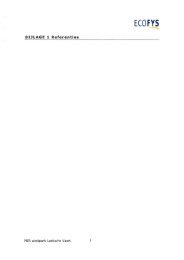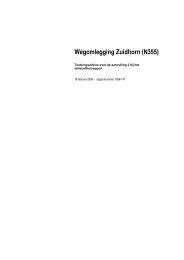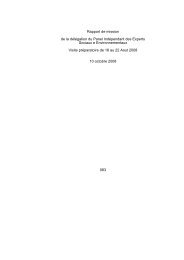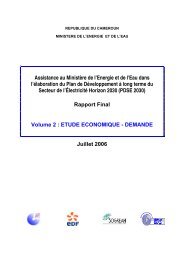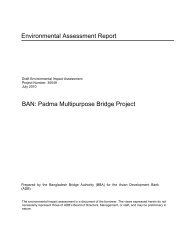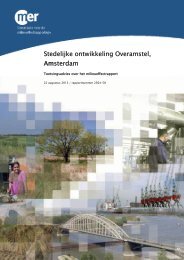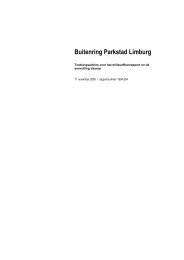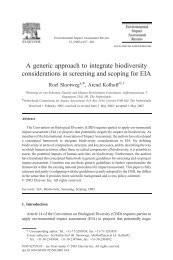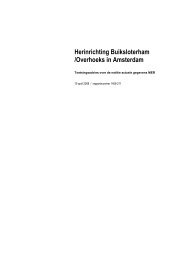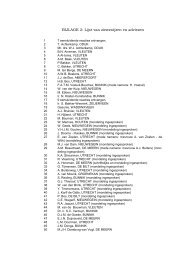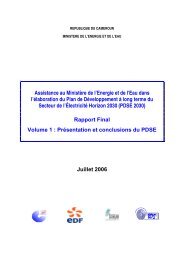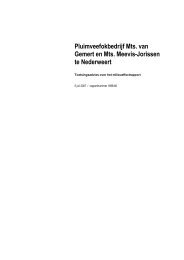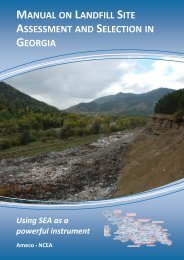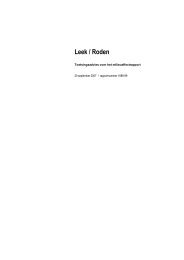Scoping Advice for the Dutch IWRM Support Programme Rwanda
Scoping Advice for the Dutch IWRM Support Programme Rwanda
Scoping Advice for the Dutch IWRM Support Programme Rwanda
Create successful ePaper yourself
Turn your PDF publications into a flip-book with our unique Google optimized e-Paper software.
7. The NCEA recommends using SEA to define and assess options <strong>for</strong> an approach at catchmentlevel. See also chapter 5.1 <strong>for</strong> fur<strong>the</strong>r guidance on this SEA. In a later stage SEAs <strong>for</strong> individualcatchment plans are recommendable (see 5.3).Selection of a catchment by <strong>the</strong> EKNAs discussed above, catchment management can be done through a pilot approach or using ablanket approach. If <strong>the</strong> pilot approach is selected, <strong>the</strong> EKN can select one or more catchments tofund pilots <strong>for</strong> catchment management. But also if <strong>the</strong> blanket approach is chosen, <strong>the</strong> EKN couldstill decide to fund management of selected catchments only, while <strong>the</strong> RWRD attracts o<strong>the</strong>rdonors to shoulder management of <strong>the</strong> remaining catchments (using <strong>the</strong> Division of Labour 28instrument to avoid duplication of ef<strong>for</strong>ts). The question would <strong>the</strong>n be which catchment(s) toselect.In <strong>the</strong> Master plan special features, characteristics and activities (water use and discharge) will beidentified per catchment. Basic water balances will be made based on <strong>the</strong> data in <strong>the</strong> MIS. At <strong>the</strong>same time, indicative predictions are expected (summer 2013) <strong>for</strong> each catchment <strong>for</strong> <strong>the</strong> years2020, 2030 and possibly 2040.8. The NCEA advises <strong>the</strong> EKN – if <strong>the</strong>y want to consider financing <strong>the</strong> developments in a certaincatchment, be it as a pilot or as part of a blanket approach - to wait <strong>for</strong> <strong>the</strong>se Master Plancatchment outcomes. This means that <strong>the</strong> <strong>for</strong>mulation of <strong>the</strong> EKN’s <strong>IWRM</strong> support programme canstart as planned, but final decisions on aspects regarding catchment management need to bechecked <strong>for</strong> consistency with <strong>the</strong> Master Plan.The Kigali workshop as well as <strong>the</strong> EKN prioritised West <strong>Rwanda</strong> as a possible selection area, andspecifically <strong>the</strong> Kivu catchment (see also Appendix 6 <strong>for</strong> more on workshop outcomes).The criteria applied by EKN <strong>for</strong> <strong>the</strong> pre-selection of <strong>the</strong> Kivu catchment are not yet clearly defined,besides having o<strong>the</strong>r EKN programmes/projects in this area. Workshop participants focussed on<strong>the</strong> perceived urgency of problems in <strong>the</strong>se catchments, with a dominant role <strong>for</strong> floods, pollutionand sedimentation. O<strong>the</strong>r criteria <strong>for</strong> catchment selection can be to learn about, <strong>for</strong> example:- Water data (such as water balance calculation)- Water use management (such as design and implementation of a possible permit system)- Socio-economic reasons (access to water <strong>for</strong> <strong>the</strong> poor, relying on water services <strong>for</strong> <strong>the</strong>irlivelihoods)- Process management (such as decision making processes (Institutional framework) or multistakeholder approaches- Emergency/disaster risk management (in flood prone areas)- Pragmatic reasons, such as quick wins (projects that yield quick, tangible results help toconvince and motivate people to adopt similar approaches) or combining <strong>Dutch</strong> developmentprogrammes (eg food security and <strong>IWRM</strong>, or energy and <strong>IWRM</strong>)28The Division of Labour is fur<strong>the</strong>r discussed in, among o<strong>the</strong>rs, <strong>the</strong> <strong>Rwanda</strong> Water Scan, August 2011, by Van ‘t Klooster, Smetand Kente on behalf of <strong>the</strong> EKN21



